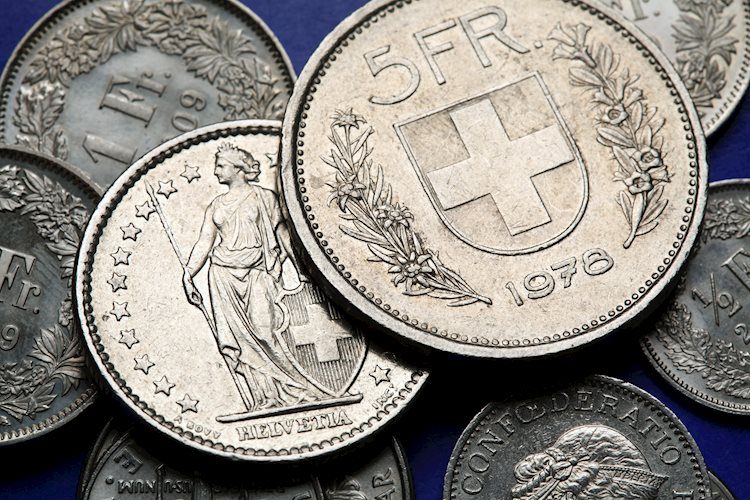- USD/CHF drifts higher to around 0.9115 in Thursday’s early European session.
- Fed Minutes signalled a cautious approach to rate cuts, supporting the USD.
- Swiss inflation slowed in December, supporting the case for more easing in interest rates by the SNB.
The USD/CHF pair gains traction to around 0.9115 during the early European trading hours on Thursday, bolstered by the stronger US Dollar (USD). The cautious stance of the Federal Reserve (Fed) and solid US economic data provide some support to the pair. Traders will monitor the Fedspeak on Thursday for more cues about the US interest rate outlook this year.
Investors scaled back rate cut bets, with pricing a less than 50% chance the Fed cuts rates ahead of its June meeting, according to the CME FedWatch Tool. “With the Federal Reserve expected to cut rates less than most other major central banks, expected interest rate differentials favor the greenback,” noted Blake Millard, director of investments at Sandbox Financial Partners.
According to minutes of the Fed’s December meeting released on Wednesday, policymakers suggested that the process could take longer than previously anticipated due to recent hotter-than-expected readings on inflation and the effects of potential changes in trade and immigration policy.
Switzerland’s inflation rate edged down in December 2024, reinforcing the Swiss central bank’s (SNB) decision to cut more interest rates this year. The country’s Consumer Price Index (CPI) rose 0.6% YoY in December, compared to 0.7% seen in November, matching the expectations. “Another interest rate cut by the SNB in March is now virtually certain,” noted GianLuigi Mandruzzato, an economist at EFG Bank. The expectations for another interest rate reduction by the SNB could weigh on the Swiss Franc (CHF) against the Greenback in the near term.
On the other hand, the persistent geopolitical tensions in the Middle East and the ongoing Russia-Ukraine war could boost the safe-haven flows, benefitting the CHF. The local news agency, Aljazeera, reported that Israel’s attack on Gaza has continued overnight, including a strike on a home in the Nuseirat refugee camp that killed two people. One of the victims was a child.
Swiss Franc FAQs
The Swiss Franc (CHF) is Switzerland’s official currency. It is among the top ten most traded currencies globally, reaching volumes that well exceed the size of the Swiss economy. Its value is determined by the broad market sentiment, the country’s economic health or action taken by the Swiss National Bank (SNB), among other factors. Between 2011 and 2015, the Swiss Franc was pegged to the Euro (EUR). The peg was abruptly removed, resulting in a more than 20% increase in the Franc’s value, causing a turmoil in markets. Even though the peg isn’t in force anymore, CHF fortunes tend to be highly correlated with the Euro ones due to the high dependency of the Swiss economy on the neighboring Eurozone.
The Swiss Franc (CHF) is considered a safe-haven asset, or a currency that investors tend to buy in times of market stress. This is due to the perceived status of Switzerland in the world: a stable economy, a strong export sector, big central bank reserves or a longstanding political stance towards neutrality in global conflicts make the country’s currency a good choice for investors fleeing from risks. Turbulent times are likely to strengthen CHF value against other currencies that are seen as more risky to invest in.
The Swiss National Bank (SNB) meets four times a year – once every quarter, less than other major central banks – to decide on monetary policy. The bank aims for an annual inflation rate of less than 2%. When inflation is above target or forecasted to be above target in the foreseeable future, the bank will attempt to tame price growth by raising its policy rate. Higher interest rates are generally positive for the Swiss Franc (CHF) as they lead to higher yields, making the country a more attractive place for investors. On the contrary, lower interest rates tend to weaken CHF.
Macroeconomic data releases in Switzerland are key to assessing the state of the economy and can impact the Swiss Franc’s (CHF) valuation. The Swiss economy is broadly stable, but any sudden change in economic growth, inflation, current account or the central bank’s currency reserves have the potential to trigger moves in CHF. Generally, high economic growth, low unemployment and high confidence are good for CHF. Conversely, if economic data points to weakening momentum, CHF is likely to depreciate.
As a small and open economy, Switzerland is heavily dependent on the health of the neighboring Eurozone economies. The broader European Union is Switzerland’s main economic partner and a key political ally, so macroeconomic and monetary policy stability in the Eurozone is essential for Switzerland and, thus, for the Swiss Franc (CHF). With such dependency, some models suggest that the correlation between the fortunes of the Euro (EUR) and the CHF is more than 90%, or close to perfect.
Read the full article here

